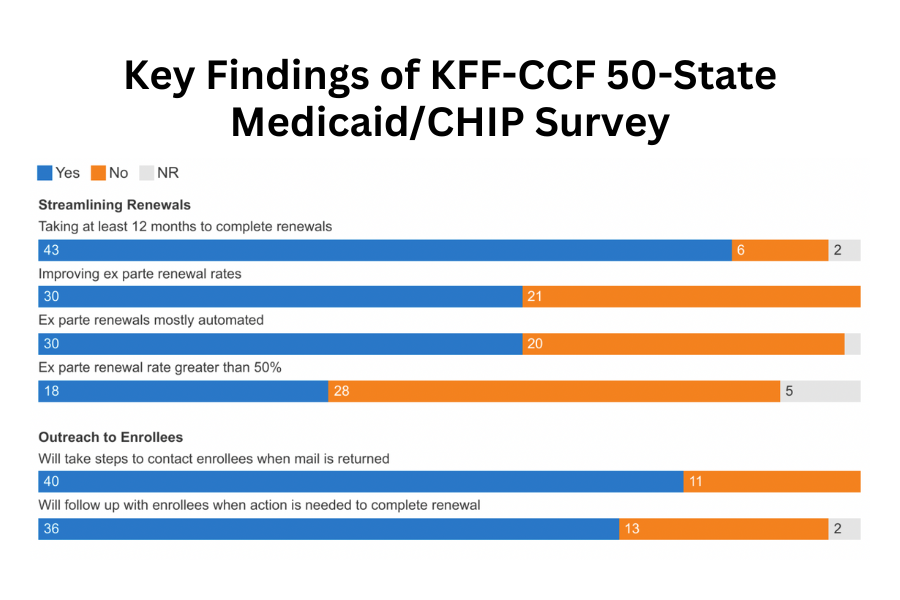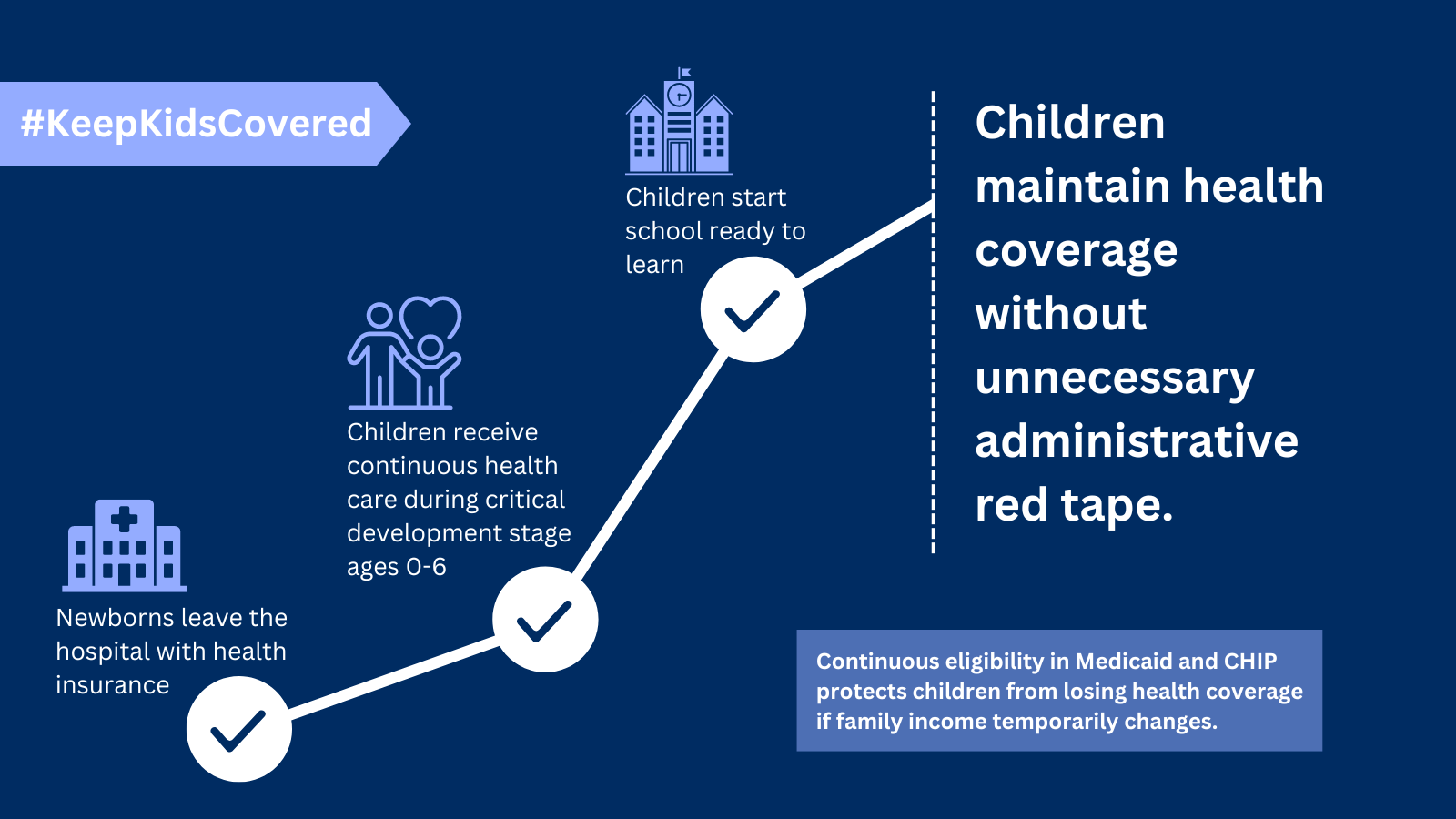Research & Reports
-
Tips and Best Practices for Unwinding the Medicaid Continuous Coverage Protection
Unwinding the Medicaid continuous coverage protection will be a heavy lift. It will be important for states to work together with community partners in the planning process. Our new and improved Tips and Best Practices outline specific action steps states can take now to be better prepared for the end of the public health emergency…
-
An Introduction to Managed Care in CHIP
DOWNLOAD THIS REPORT Introduction The Children’s Health Insurance Program (CHIP) was enacted 25 years ago. [1] Today it provides coverage for children whose family incomes are too high to allow them to qualify for Medicaid but too low to enable them to afford private health insurance coverage. Together, CHIP and Medicaid insure over half [2]…
-
State Trends to Leverage Medicaid Extended Postpartum Coverage, Benefits and Payment Policies to Improve Maternal Health
Introduction Medicaid and the Children’s Health Insurance Program (CHIP) finance nearly half of all births each year, including a disproportionate share of births to women of color and women living in rural areas. *[1] Medicaid’s foundational role in maternity care financing presents a critical opportunity to leverage the program to respond to the ongoing U.S.…
-
Medicaid and CHIP Eligibility, Enrollment, and Renewal Policies as States Prepare for the Unwinding of the Pandemic-Era Continuous Enrollment Provision
Executive Summary In the third year of the COVID-19 public health emergency (PHE), Medicaid enrollment continued to increase albeit at a slower pace than in the first two years of the coronavirus pandemic. Since March 2020, states have provided continuous enrollment in Medicaid in exchange for enhanced federal funding. This continuous enrollment provision and enhanced…
-
Fact Sheet: State Fiscal Incentives for Medicaid Expansion Continue After End of Public Health Emergency
The end of the continuous coverage requirement will exacerbate and highlight the coverage gap in the 11 states still refusing the federal Medicaid expansion. Importantly, generous federal fiscal incentives are available to states that newly expand Medicaid. These incentives were enacted in 2020, and will remain available on a permanent basis to those 11 states.…
-
Mississippi Women of Reproductive Age Face Many Barriers to Good Health
Mississippi Women of Reproductive Age Face Many Barriers to Good Health In April 2022, a new state policy option, recently made permanent by federal law, went into effect that provided states a simplified route to extend postpartum coverage in Medicaid from 60 days to a full 12 months after a child’s birth. If implemented in…
-
Child Uninsured Rate Could Rise Sharply if States Don’t Proceed with Caution
Policy Landscape Medicaid is the backbone of the nation’s health care system providing coverage to those for whom private insurance is not available or affordable and is now the primary coverage source (along with CHIP) for America’s children. Medicaid covers approximately 83.5 million people (including more than 34.2 million children) — a 31 percent increase…
-
Consolidated Appropriations Act, 2023: Medicaid and CHIP Provisions Explained
On December 29, 2022, President Biden signed into law the Consolidated Appropriations Act, 2023 (P.L. 117-328).[1] The Consolidated Appropriations Act includes a number of provisions related to Medicaid and the Children’s Health Insurance Program (CHIP). This includes, among others, delinking the Medicaid continuous coverage requirement from the COVID-19 public health emergency and starting its unwinding…
-
Number of Uninsured Children Stabilized and Improved Slightly During the Pandemic
Data released by the U.S. Census Bureau’s American Community Survey (ACS) for 2021 finds that nationally the estimated number and rate of uninsured children went down slightly from 2019 to 2021. This data provides the first comprehensive look at what happened to children with respect to this metric during the first part of the COViD-19…
-
Number of Uninsured Children Stabilized and Improved Slightly During the Pandemic
Data released by the U.S. Census Bureau’s American Community Survey (ACS) for 2021 finds that nationally the estimated number and rate of uninsured children went down slightly from 2019 to 2021. This data provides the first comprehensive look at what happened to children with respect to this metric during the first part of the COVID-19…
-
State Opportunities to Improve Health Care Coverage for Child Care Professionals
States are grappling with how to more effectively support their child care workforce, including ensuring providers have access to affordable health care. Just like parents, frontline early education professionals are better able to support children in their care when they are healthy. A healthy caregiver is especially important for young children because brain development in…
-
Comments on Streamlining Medicaid/CHIP Eligibility Determination, Enrollment and Renewal Processes
Georgetown University Center for Children and Families submitted these comments to CMS on the “Streamlining the Medicaid, Children’s Health Insurance Program, and Basic Health Program Application, Eligibility Determination, Enrollment, and Renewal Processes Proposed Rule.” EE NPRM CCF Comments
-
Comments on Amendments to “KanCare” Medicaid Demonstration
The Georgetown University Center for Children and Families and the Center on Budget and Policy Priorities submitted the following comments to CMS regarding Kansas’ application to amend the “KanCare” Medicaid demonstration that would authorize continuous eligibility for parents and caretaker relatives. KanCare Amendment Comments
-
Comments on Temporary Increase in FMAP in Response to Covid-19 Public Health Emergency Reopening of Public Comment
Georgetown University Center for Children and Families submitted comments to CMS on the “Medicaid Program; Temporary Increase in Federal Medical Assistance Percentage (FMAP) in Response to the COVID-19 Public Health Emergency (PHE); Reopening of Public Comment Period”. CCF Comments IFR-C MOE 2022
-
Gracias a las leyes federales, hay menos niños sin seguro medico en Georgia, pero eso podría cambiar pronto
Georgia ocupa el cuarto lugar entre los estados con el peor número de niños sin seguro médico, con un estimado de 176,000 niños sin cobertura de salud. Comparado con los estados vecinos del sur, Georgia tiene un desempeño insatisfactorio. La tasa de niños sin seguro en todos los estados vecinos—con excepción de la Florida—es mucho…
-
The Number of Uninsured Children in Georgia Has Declined Thanks to Federal Law But May Rise Soon
The state of Georgia has the fourth highest number of uninsured children with an estimated 176,000 Georgia children going without health coverage. Georgia performs poorly in comparison to its neighbors in the deep south. All of Georgia’s neighboring states—with the exception of Florida—have better child uninsured rates (see Figure 1). Children without health insurance have…
-
Restoring the Public Charge Policy
The Department of Homeland Security (DHS) issued a final regulation that restores longstanding public charge policy, effective December 23, 2022. This comes after attempts by the Trump Administration to radically expand the scope and nature of the public charge test, making it much harder for some immigrants to adjust their status and discouraging many more…
-
Medicaid and CHIP Continuous Coverage for Children
States have the option under current law to provide 12 months of continuous health coverage for children in Medicaid and the Children’s Health Insurance Program (CHIP) so that children can maintain coverage throughout the year even as their family income fluctuates from month to month. Under this option, states allow a child to remain enrolled…
-
Comments on Tennessee’s Proposed “Amendment 4” to TennCare III Demonstration
The following organizations joined Georgetown University Center for Children and Families in submitting comments to HHS regarding Tennessee’s proposed “Amendment 4” to its TennCare III Demonstration. ACNM Tennessee Affiliate American College of Obstetricians and Gynecologists (ACOG) American Lung Association Autistic Self Advocacy Network Center for Law and Social Policy Center on Budget and Policy Priorities…
-
En Georgia las mujeres en edad reproductiva enfrentan muchos obstáculos para recibir atención médica
En Georgia 1 de cada 5 mujeres en edad reproductiva no tiene seguro médico Debido en gran parte a la decisión de no expandir Medicaid, Georgia tiene una de las tasas más altas de mujeres en edad reproductiva (18-44 años) sin seguro médico de todo el país: casi 1 de cada 5 (19.3%) no cuenta con seguro…














